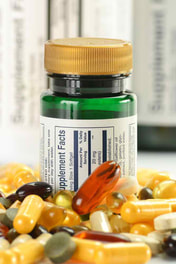 When talking about health supplements or medications, you may hear the term "enteric coating". This term is in reference to the substance (usually made from fatty acids, shellac, waxes or plastics) that is applied to certain oral medications/supplements, which creates a barrier to prevent irritation of the stomach by the drug, and protects the drug from stomach acid. The word enteric refers to the small intestine, so when a product is enteric coated, it means that it is meant to be absorbed in the small intestine, and NOT in the acids produced by the stomach during the digestive process. Aspirin, for example, can have an irritating effect on the stomach, so it is coated with a substance that will only dissolve in the small intestine. The coatings work by creating a surface that is stable at the highly acidic pH found in the stomach, but breaks down rapidly at a less acidic (basic) pH. Meaning they will not dissolve in the acidic juices of the stomach (pH ~3), but they will in the higher pH (above pH 5.5) environment present in the small intestine.
3 Comments
|
(800) 959-8872 (M-F: 7am - 4pm PST)
Copyright © 2004-2024 Southwest Nutraceuticals. All Rights Reserved.
Privacy Policy | Terms of Service
*These statements have not been evaluated by the Food and Drug Administration. This product is not intended to diagnose, treat, cure or prevent any disease.
For all conditions or illnesses, see a healthcare professional for a full evaluation, diagnosis or treatment plan.
Prices are subject to change without notice.
Privacy Policy | Terms of Service
*These statements have not been evaluated by the Food and Drug Administration. This product is not intended to diagnose, treat, cure or prevent any disease.
For all conditions or illnesses, see a healthcare professional for a full evaluation, diagnosis or treatment plan.
Prices are subject to change without notice.

 RSS Feed
RSS Feed

